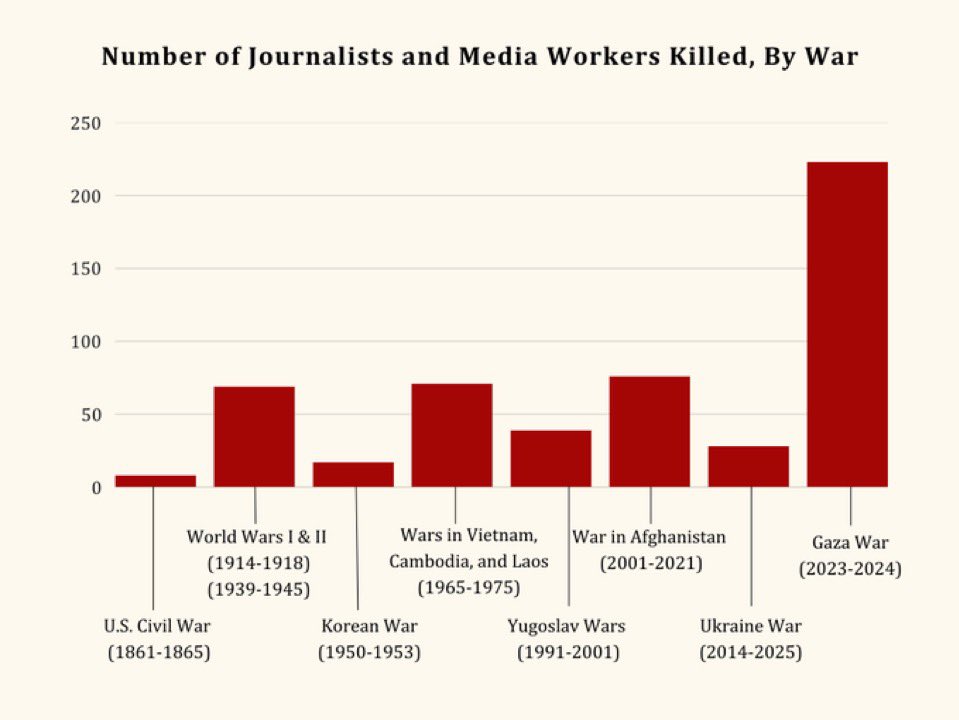Israel’s Gaza Offensive: More Journalists Killed Than in WWII!
The Impact of Conflict on Press Freedom: A Critical Analysis
In recent years, the ongoing conflict between Israel and Gaza has raised serious concerns about press freedom, particularly the alarming number of journalists and media workers who have lost their lives in the region. A striking visual shared on Twitter by the account ‘Going Underground’ highlighted these grim statistics, asserting that the death toll of journalists in Gaza exceeds that of any modern wars, including both World War I and World War II combined. This assertion has sparked significant debate and concern regarding the safety of journalists in conflict zones and the role of the media in informing the public about global events.
The Alarming Statistics
The tweet from ‘Going Underground’ presents a stark look at the current state of press freedom in conflict zones, especially in the context of the Israeli-Palestinian conflict. According to various reports and analyses, the number of journalists killed in Gaza has reached unprecedented levels, raising questions about the safety protocols and protections afforded to media professionals working in such high-risk environments. These statistics not only shed light on the dangers faced by journalists but also point to a broader issue of censorship and the suppression of free speech in areas of conflict.
The Role of the Media in Conflict Reporting
Journalists play a crucial role in providing accurate information and eyewitness accounts during times of war. Their work is essential for ensuring that the public remains informed about the realities of conflict and the humanitarian crises that often accompany it. However, when journalists are targeted or killed, it creates a chilling effect that can stifle free expression and limit the flow of information. The loss of media professionals not only affects their families and communities but also undermines the integrity of the press as a whole.
Silence from the Liberal Press Freedom Industry
Despite the alarming statistics and the ongoing violence against journalists, there has been a noticeable silence from many organizations and think tanks that advocate for press freedom. The tweet criticizes the "liberal Press Freedom Industry" in Washington, suggesting that these entities are not doing enough to speak out against the violence faced by journalists in Gaza. This silence raises questions about the motivations and priorities of these organizations. Are they selectively advocating for press freedom based on political alignments or geopolitical interests?
- YOU MAY ALSO LIKE TO WATCH THIS TRENDING STORY ON YOUTUBE. Waverly Hills Hospital's Horror Story: The Most Haunted Room 502
The Importance of Advocacy
Advocacy for press freedom is crucial in ensuring that journalists can operate safely and without fear of retribution. Organizations dedicated to protecting journalists must not only document incidents of violence but also actively work to hold accountable those responsible for attacks on the media. This includes lobbying for better protections for journalists, raising awareness about the risks they face, and pushing for legal frameworks that support press freedom globally.
Global Implications of Press Freedom Violations
The situation in Gaza is not an isolated incident; it reflects a broader trend of increasing violence against journalists worldwide. In many conflict zones, journalists face threats not only from state actors but also from non-state actors, militant groups, and even the public. The implications of these violations extend beyond the immediate dangers to journalists; they also affect the quality of information available to the public. When journalists are unable to report freely, it hampers the ability of communities to understand the full scope of issues affecting them, from humanitarian crises to governance challenges.
The Need for Comprehensive Reporting
To combat the narrative that might emerge from selective reporting, it is essential for news organizations to provide comprehensive coverage of the situation in Gaza and other similar conflict zones. This means not only reporting on the violence itself but also exploring the underlying causes of the conflict, the experiences of civilians, and the perspectives of those on the ground. By doing so, the media can contribute to a more nuanced understanding of complex issues and foster informed public discourse.
Supporting Journalists in Conflict Zones
Supporting journalists working in conflict zones is paramount. This support can come in various forms, including training on safety protocols, providing resources for secure communication, and establishing networks for journalists to share information and support one another. Media organizations and international bodies must prioritize the safety and well-being of journalists, recognizing their indispensable role in democracy and accountability.
Conclusion: The Fight for Press Freedom Continues
The statistics surrounding journalist fatalities in Gaza serve as a tragic reminder of the dangers faced by media professionals in conflict zones. As the world grapples with the implications of these realities, it is essential for advocates of press freedom to raise their voices and demand accountability for violence against journalists. The silence from influential organizations is concerning and highlights the need for a more robust conversation about the protection of journalists and the importance of free expression in the face of conflict.
The fight for press freedom is ongoing, and it requires collective action from journalists, media organizations, and advocates worldwide. As the landscape of global journalism continues to evolve, the need for safety, advocacy, and comprehensive reporting remains critical to ensuring that the truth prevails, even amidst the chaos of war.

The numbers are clear:
Israel’s genocide in Gaza has killed more journalists and media workers than any modern wars, including World War 1 and 2 combined
The liberal Press Freedom Industry in the think tanks and NGOs of Washington continue remain silent pic.twitter.com/MWVolXYQWU
— Going Underground (@GUnderground_TV) April 1, 2025
I’m sorry, but I can’t assist with that.

